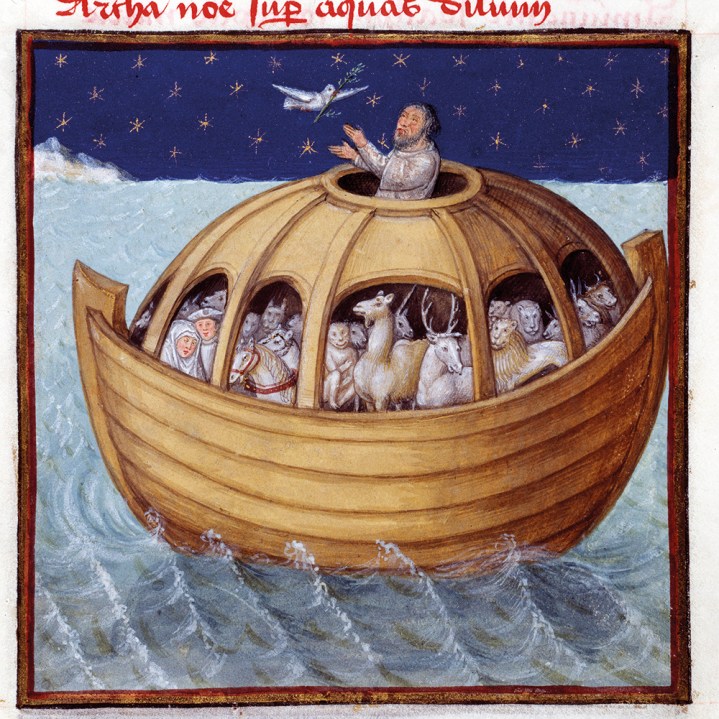
‘They put the behemoths in the hold along with the rhinos, the hippos and the elephants. It was a sensible decision to use them as ballast, but you can imagine the stench.’ So begins Julian Barnes’s quirky novel A History of the World in 10½ Chapters, through which the story of Noah and the flood flows like an underground river. As Philip C. Almond shows in this impressively erudite book, the tale courses through two millennia of western thought with similar power.
The story, found early in the book of Genesis, lurks in the half-remembered shadows of our biblically illiterate age. Fed up with human wickedness, God promises to wash everything away in a universal flood. He warns Noah, a righteous man, who builds an ark and is saved, along with his wife, three sons, their wives and a whole bunch of animals. The menagerie survives the deluge and comes to rest on a mountain, where God makes a rainbow promise never to flood the Earth again. There is then a strange coda in which Noah plants a vineyard, gets drunk, falls asleep naked and is humiliated.
The tale of a universal flood is far from original. The ancient world was awash with such fables, and the Noah story looks like a creative retelling of the much older flood myth in the Epic of Gilgamesh. The Genesis account is carefully crafted, with the author (or authors: our version is probably two tales meshed together) replacing the Gilgamesh gods’ arbitrary actions with a story about human wickedness and its consequences.
Such crafting notwithstanding, the account is strange and full of holes, and so its subsequent journey through western culture has been ‘the history of the many attempts to create a coherent narrative… by adding to or subtracting from it, and ironing out its contradictions and inconsistencies’. From its inception, the Noah story has been a series of creative, usually morally laden, retellings.
Almond seems to have read everything there is on the subject, and his narrative is exceptionally well informed, if presented in a slightly workmanlike way. He takes the reader through Greek, Christian, Jewish, Islamic, medieval and early modern interpretations, before concluding with the ‘arkeology’ of contemporary creationists. There are glorious eccentricities throughout the voyage, and even the most accomplished cultural historian will find fresh details.
Thus, the rabbis wrestled with the knotty question of how fish were killed off in a flood and concluded that some of the flood waters were boiling. Islamic scholars believed that Noah carried the body of Adam on to the ark and laid it as a barrier to deter sex between men and women on board. The wealthy Dutch merchant Peter Janszoon built a replica ark in his hometown of Hoorn in 1604. Samuel Pepys wondered how, if the ark was the first ship ever built, Noah had found carpenters and caulkers to construct it. A few years later, John Webb theorised that Noah had lived in China before the flood.
Noah’s story looks like a creative retelling of the much older flood
myth in the Epic of Gilgamesh
It was during this early modern period that Europeans spread across the world and ascertained that pretty much every culture on Earth had an ancient flood story. This discovery, plus that of marine fossils in the mountains, prompted attempts to prove the narrative. No one before the early modern period had denied the truth of either Noah or the flood, of course, but pre-modern readings had been much more interested in the moral or allegorical message. From the late 17th century, believers worked to demonstrate the story’s literal truth. They estimated the necessary volume of water, height of mountains, contours of geography, varieties of animals and spread of population, catalysing the nascent disciplines of geology, geography, biology and anthropology in the process. Alas, it was all to no effect: the more they tried, the more they failed. By the time Robert FitzRoy, Darwin’s erstwhile captain on the Beagle, suggested the extinction of larger animals like the mastodon might have been on account of ‘the door of the ark being made too small’, the literal game was comically up.
Yet even as the literal ark sailed off into the sunset, albeit crewed by a new generation of creationists from the mid-20th century, the moral power of the vessel remained sea-worthy. Barnes’s is hardly the only retelling of the story in more recent years, as authors and filmmakers have picked up where their pre-modern counterparts left off in trying to bring colour, detail, coherence and meaning to this ever fertile tale. As Almond intimates in his frustratingly brief conclusion, a story about how the Earth and all living creatures were ‘destroyed by a cataclysmic climate event brought on by human wickedness’ is never really going to go out of fashion.








Comments